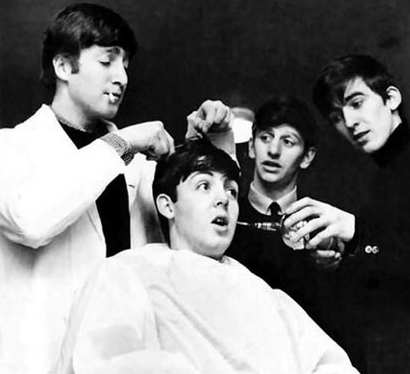iain ellis's
BRIT WITS:
A HISTORY OF BRITISH
ROCK HUMOR

reviewed by
FARZANA HASSAN
______________________
Farzana
Hassan is the author of Prophecy
and the Fundamentalist Quest. Please visit
her website at: www.farzanahassan.com
Brit
Wits: A History of British Rock Humor by Iain Ellis is
an interesting read. Published by Intellect Ltd., the book chronicles
developments in British rock humour from the 1950s to the present
decade -- a charming but uncommon topic for a book. It delves
into the history of British rock humour by examining the past
from the time of the music hall era in Britain to the current
age of digital sounds.
While
the author acknowledges many outside influences on British rock
music, he also highlights a purely indigenous comedic strain
that gives British rock music its distinctive character. It
is a humour that according to Ellis “abounds in intellectual
twists of logic and rhetoric, nonsense, wordplay, and pun. British
rock humour embodies the music hall’s “sexual innuendo
and acrobatic physical comedy.”
In
the last century, Britain’s class structure had given
rise to a distinct subversive humour that would continue to
evolve throughout the century. Class divisions being more pronounced
in Britain than in the United States, British rockers would
rebel against the tyranny of entrenched class hatred through
their songs, colloquialisms and lyrics. One such pioneer of
the British rock humour was George Formby from Lancashire.
Young
British rockers of the 1950s were nonetheless influenced by
the pervasive American rock industry. Though they were rarely
as successful as their American counterparts, they continued
to emulate American icons. The Teddy Boys were an example of
American-inspired British rockers who, in fact, invited much
condemnation for behaviour that was deemed outrageous by  British
elders. There was hence a need to create a distinct British
rock identity. That desire was fulfilled by Lonnie Donegan in
his album entitled Rock Island Line in 1955.
British
elders. There was hence a need to create a distinct British
rock identity. That desire was fulfilled by Lonnie Donegan in
his album entitled Rock Island Line in 1955.
The
Beatles of course were the main sensation of the sixties. Their
mop-top haircuts were part of their subversive humour according
to the author. They both charmed and dazzled their British and
American audiences, the latter being particularly intrigued
by their quaint English accents. Other British bands like The
Kinks were “as much humourists who used rock as they were
rockers who used humour”. But the more British rockers
came into contact with their American counterparts, the more
they developed their own unique interpretations of the genre.
It
was David Bowie, with his art school wit, Ian Dury and his disco-funk
workouts and the Punk rockers who dominated the rock music scene
of the seventies. The Slits were also London punk rockers who
happened to “redefine gender.”  These
punk rockers were all humourists at heart according to Ellis.
These
punk rockers were all humourists at heart according to Ellis.
The
eighties saw the rise of the New Traditionalists and New Romantics.
They were masters at “incongruity humour.” New Romantic
humour used music and lyrics to convey its highly intellectual
content, while the new traditionalists proved to be their “inverse.”
They were hence the defenders of Rock music’s core principles.
Rock humour employed by The Smiths was also subversive in that
it once again rebelled against prevailing social norms. The
eighties also witnessed significant progress in Scottish rock
music as part of the overall British rock humour scene.
With
the nineties came the Spice Girls. They played many comedic
roles through dress and demeanor, with Melanie Chisholm dressing
in track suits and soccer shirts while wearing her hair  in
a pony tail. Their humour, however, was largely concerned with
redefining gender roles for young women.
in
a pony tail. Their humour, however, was largely concerned with
redefining gender roles for young women.
Blur
emerged as a popular band in the nineties. Albarn, its lead
singer, “sang of all things” English in a “mockney”
accent, mocking, the daily routines of ordinary Brits, like
going to church on Sunday and ending the day playing bingo.
Finally,
in the last decade after the turn of the century, Brit Wits
continued to use humour in music as their main creative force.
They still continue to mock prevailing social custom through
subversive humour. Lady Sovereign, as an example, suggests that
England “aint all crumpets and trumpets, its one big slum
pit.”
Brit
Wits: A History of British Rock Humor is a methodical and
detailed history of British Rock humour. It is an exceptionally
well-written book that brings to notice the importance of humour
in British rock and how well it has been employed by British
rock artists throughout the last decades.